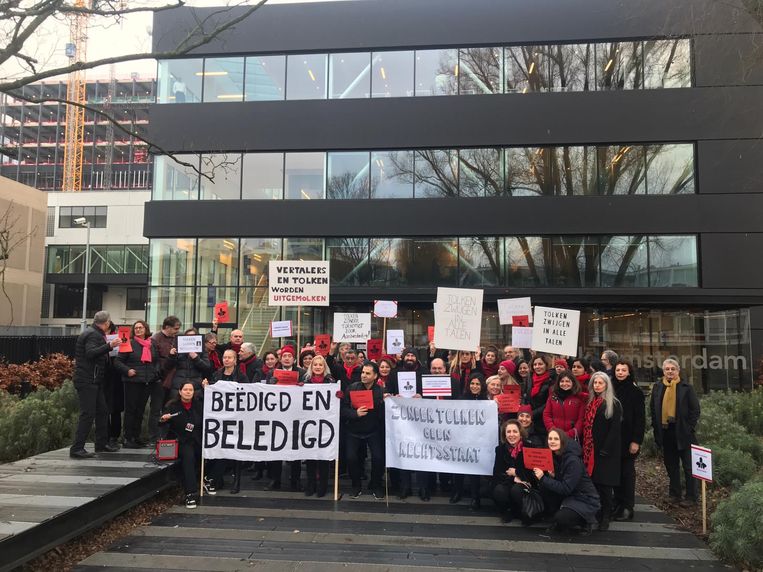
Sworn translators and interpreters protesting in front of the courthouse in Amsterdam on 13 January 2020. Image by Jaike Reitsema.
Although all interpreters do is talk, we’re not known to be very vocal. We are hard-working people who prefer not to be the centre of attention. Many of us work in public service: interpreting for the police, the courts or immigration services. Others specialise in wiretap transcription or healthcare.
Despite lobbying from various organisations that support public service interpreters and translators, hourly rates have remained the same as they were over 30 years ago. Promises about improving working conditions have never materialised. At the same time, the requirements for entry in the register of sworn/certified interpreters and translators (Rbtv) have gone up, as have the costs to keep your registration active through regular CPD courses. Many experienced colleagues feel it’s simply impossible to earn a decent income; as independent professionals, their work load is unpredictable. It also involves a lot of travelling, which means interpreters cannot work 40 hours a week. As a result, there is now a shortage of interpreters into a number of languages.
Things came to a head in 2017, when a government report was published with the unsavoury title ‘Don’t tolk too much’ – a play on words involving the Dutch word for ‘interpreter’. The report highlighted the need to streamline availability and lower costs. This resulted in a programme by the Ministry of Justice and Security called ‘Tolken in de toekomst’ ('Interpreting in the future'). Key points: streamlining the way government authorities purchase interpreting and translation services, while also providing room for innovation. Sounds reasonable, doesn’t it?
Unfortunately, the solutions the Ministry proposed (and the position they took in online consultations and face-to-face meetings with stakeholders) have baffled and angered professional interpreters and translators:
- Further outsourcing of interpreting and translation services currently handled by in-house planners. The first pilots are already running: interpreters are now also being called in for court hearings via intermediaries – at even lower rates. Obviously, interpreters who refuse to work for these mediators are no longer contacted, so an increasing number of sensitive cases is handled by unqualified interpreters.
- Including B2 speakers in the official register to solve the shortage. Obviously, this was the last straw for many interpreters who spent years studying to get a degree and to get their language skills at C1/C2 level, only to see now that a simple secondary school diploma will be enough. No requirements are specified regarding the professional skills required – simultaneous interpreting, ethics, jargon, et cetera – for entry at B2 level, and there are no plans for monitoring and quality control.
- A new payment system, including a minimum rate that hasn’t been indexed since 1984. The current travel expense scheme is downgraded to €0.19(ish) per km, which disregards the fact that interpreters can’t work while travelling. Parking and car maintenance (previously covered by voorrijkosten or call-out charge) are no longer reimbursed.
In early 2019, a group of over 100 interpreters joined forces as Tolken en Vertalers in Actie and contacted a lawyer to see what legal action they could take. After calling in the help of lobbying organisation ZZP Nederland, the group adopted a resolution and announced strikes. In the week of 13-19 January 2020, a large number of interpreters went on strike and demonstrated at various courthouses in the Netherlands to demand attention for their position. This has since resulted in a round-table meeting with MPs of the Justice and Security Committee and questions being posed in Parliament, but Minister Grapperhaus has yet to issue a formal response.
What will the future look like for public service interpreters and translators? A lot is still unsure, but we will continue to fight for fair compensation and proper regulation of the profession. The next strike is planned for 19 February at Plein 2, The Hague – the date of the debate between the Minister and the committee. For more information,
